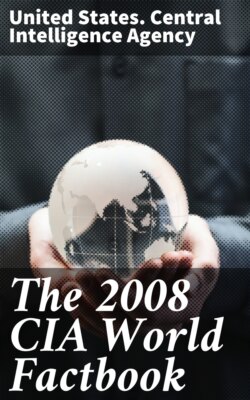Читать книгу The 2008 CIA World Factbook - United States. Central Intelligence Agency - Страница 262
На сайте Литреса книга снята с продажи.
ОглавлениеIndependence:
13 August 1960 (from France)
National holiday:
Republic Day, 1 December (1958)
Constitution:
ratified by popular referendum 5 December 2004; effective 27 December 2004
Legal system:
based on French law; has not accepted compulsory ICJ jurisdiction
Suffrage:
21 years of age; universal
Executive branch:
chief of state: President Francois BOZIZE (since 15 March 2003 coup) head of government: Prime Minister Faustin-Archange TOUADERA (since 22 January 2008) cabinet: Council of Ministers elections: under the new constitution, the president elected to a five-year term (eligible for a second term); elections last held 13 March and 8 May 2005 (next to be held in 2010); prime minister appointed by the political party with a parliamentary majority election results: Francois BOZIZE elected president; percent of second round balloting - Francois BOZIZE (KNK) 64.6%, Martin ZIGUELE (MLPC) 35.4%
Legislative branch:
unicameral National Assembly or Assemblee Nationale (105 seats; members are elected by popular vote to serve five-year terms) elections: last held 13 March 2005 and 8 May 2005 (next to be held in 2010) election results: percent of vote by party - NA; seats by party - KNK 42, MLPC 11, RDC 8, PSD 4, FPP 2, ADP 2, LONDO 1, independents 34, other 1
Judicial branch:
Supreme Court or Cour Supreme; Constitutional Court (3 judges
appointed by the president, 3 by the president of the National
Assembly, and 3 by fellow judges); Court of Appeal; Criminal Courts;
Inferior Courts
Political parties and leaders:
Alliance for Democracy and Progress or ADP [Jacques MBOLIEDAS];
Central African Democratic Rally or RDC [Andre KOLINGBA]; Civic
Forum or FC [Gen. Timothee MALENDOMA]; Democratic Forum for
Modernity or FODEM [Charles MASSI]; Liberal Democratic Party or PLD
[Nestor KOMBO-NAGUEMON]; Londo Association or LONDO; Movement for
Democracy and Development or MDD [David DACKO]; Movement for the
Liberation of the Central African People or MLPC [Ange-Felix
PATASSE] (the party of deposed president); National Convergence or
KNK; Patriotic Front for Progress or FPP [Abel GOUMBA]; People's
Union for the Republic or UPR [Pierre Sammy MAKFOY]; National Unity
Party or PUN [Jean-Paul NGOUPANDE]; Social Democratic Party or PSD
[Enoch LAKOUE]
Political pressure groups and leaders:
Monam (combating gender-base violence)
International organization participation:
ACCT, ACP, AfDB, AU, BDEAC, CEMAC, FAO, FZ, G-77, IAEA, IBRD, ICAO,
ICCt, ICRM, IDA, IFAD, IFC, IFRCS, ILO, IMF, Interpol, IOC, ITSO,
ITU, ITUC, MIGA, NAM, OIC (observer), OIF, OPCW, UN, UNCTAD, UNESCO,
UNIDO, UNWTO, UPU, WCL, WCO, WFTU, WHO, WIPO, WMO, WTO
Diplomatic representation in the US:
chief of mission: Ambassador Emmanuel TOUABOY chancery: 1618 22nd Street NW, Washington, DC 20008 telephone: [1] (202) 483–7800 FAX: [1] (202) 332–9893
Diplomatic representation from the US:
chief of mission: Ambassador Frederick B. COOK embassy: Avenue David Dacko, Bangui mailing address: B. P. 924, Bangui telephone: [236] 61 02 00 FAX: [236] 61 44 94 note: the embassy is currently operating with a minimal staff
Flag description:
four equal horizontal bands of blue (top), white, green, and yellow with a vertical red band in center; a yellow five-pointed star to the hoist side of the blue band
Economy
Central African Republic
Economy - overview:
Subsistence agriculture, together with forestry, remains the backbone of the economy of the Central African Republic (CAR), with more than 70% of the population living in outlying areas. The agricultural sector generates more than half of GDP. Timber has accounted for about 16% of export earnings and the diamond industry, for 40%. Important constraints to economic development include the CAR's landlocked position, a poor transportation system, a largely unskilled work force, and a legacy of misdirected macroeconomic policies. Factional fighting between the government and its opponents remains a drag on economic revitalization. Distribution of income is extraordinarily unequal. Grants from France and the international community can only partially meet humanitarian needs.
GDP (purchasing power parity):
$3.007 billion (2007 est.)
GDP (official exchange rate):
$1.714 billion (2007 est.)
GDP - real growth rate:
4% (2007 est.)
GDP - per capita (PPP):
$700 (2007 est.)
GDP - composition by sector:
agriculture: 55% industry: 20% services: 25% (2001 est.)
Labor force:
1.857 million (2006)
Unemployment rate:
8% (23% for Bangui) (2001 est.)
Population below poverty line:
